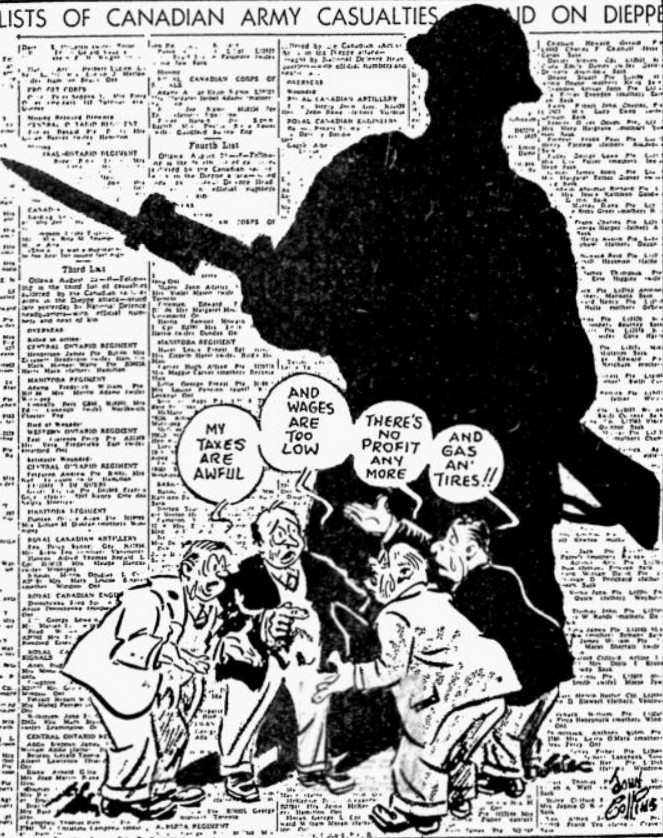U.S. Commandos at Dieppe admit raid looked a ‘suicide mission’
London, England (AP) – (Aug. 21)
The Commando raid on Dieppe “looked like a suicide mission” to four American Rangers, attached to Lord Lovat’s command, but, as Cpl. William R. Brady of Grand Forks, North Dakota, put it today:
Damned if we didn’t make it.
The suicide idea occurred to Brady and his companions when they were ordered to storm a 75-foot cliff, north of Dieppe. The others are:
- Staff Sgt. Kenneth Stemson of Russell, Minnesota
- Sgt. Alex J. Szima of Dayton, Ohio
- Cpl. Franklin M. Koons of Swea City, Iowa.
The four said they believed they were the first United States troops to fight on French soil in this war. They believed they were ahead of other Rangers in the raid before they were assigned to a unit which was ordered to go forward and knock out a six-gun battery (apparently anti-aircraft).
They came back from the death-ridden gunports around Dieppe with undoubted admiration for British fighting qualities, and they praised the Canadians as “one hell of a fine bunch.”
Brady was in the first group to land on the beach. They scaled a cliff to knock out two German pillboxes.
He said:
It looked like a suicide mission but damned if we didn’t make it.
He continued:
I was the last man over and found the first pillbox empty.
Machine-gun bullets were spraying the ground from Nazi .50-calibre guns in another pillbox. The party halted beside the first pillbox and, as Brady said:
What the hell! We thought we’d do get the other one.
They started for it, but then paused while Bill Phinney, a British Commando, thoughtfully climbed a telegraph pole through a hail of bullets and cut the wires.
As they neared the pillbox two Spitfires came to their aid. The British planes swooped low and “neutralized” the pillbox with machine-gun bullets.
All this time, the group was under fire from German snipers.
Brady said:
We let them go ahead – we didn’t lose a man.
They moved forward then to a crossroads where they encountered a German patrol of 10 men. The group opened fire, the Americans with Garand rifles, and got five.
The others, Brady said:
…got the hell out of there.
One of the Americans said:
I believe I was scared when we had to cross a field 200 yards wide under fire.
But the British were so damned calm about it that it seemed like a manoeuvre. You can depend on them.
Stemson was in the same party which was roughly handled by the Germans.
Four of the British were killed and three wounded.
None of the Americans attached to Lord Lovat’s unit were killed and American casualties in the entire raid were light.
Koons praised the “wonderful job” done by the RAF, to cover his party’s landing. Under this cover, they reached a ravine used by bathers in happier times to get down the cliffside. There they found barbed wire with a sign in German and English reading:
Attention – Mines.
Koons said:
We figured this was a bluff, so we said “to hell with it” and went right through after blowing up some wire with a Bangalore torpedo.
The party moved about 600 yards through good cover to an orchard.
Szima said there was an anti-aircraft gun there and “we were about to fire on it.”
He said:
Any minute I thought I’d see a German helmet followed by a handful of grenades.
They found a dead German in the orchard with his chest blown away and then got ready to wipe out a German gun crew.
Szima said:
I saw them getting ready to fire at the Spitfires. I got my rifle ready when a British officer said we’d do it the quick way. So, he calls up some Bren gunners and they chopped down the gun crew.
They started firing back. My hat fell off. I bent over to pick it up and found a bullet hole in it. Then I got a bullet over my shoulder. Another hit the concrete. That guy had me picked as his meat.
Two Germans in a nearby house attacked the party.
Jim Haggerty, a British Commando, whom Szima called “the toughest guy I ever saw,” blew the German out of the window with a grenade.
All the Americans agreed that the Germans were “plenty tough” and had wonderful field craft.
The boys couldn’t say enough in praise of the British troops. They told how Sgt. Maj. Charlie Williams, with a hole blown in his back, had directed the company’s fire and how another non-commissioned officer lay with a bullet in his stomach, firing until he died.
Koons said:
You know what covering fire is. You stand there and hope to God you’ll see a German but you don’t.
At every clearing we got bullets until we reached the cliff. When we got there, we had two breaks. We heard a tremendous explosion as Lovat’s guys blew up some six-inch guns and down in the beach we saw the boats ready to take off.
Brother, they looked awfully sweet.
